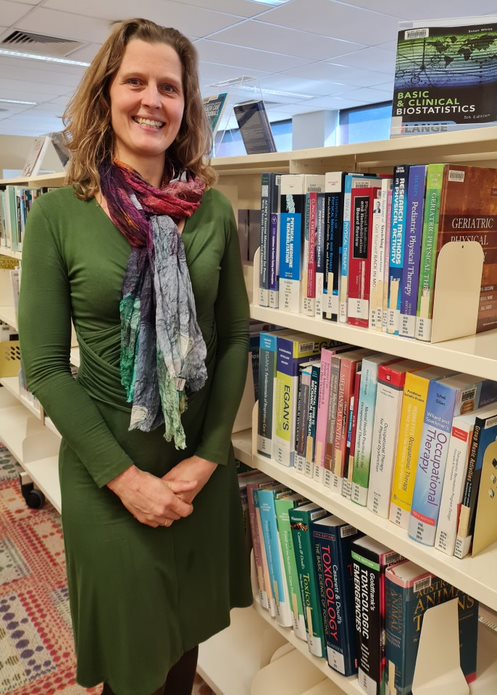August 16, 2021
Interview with Dr Anna Vinkhuyzen
Position: Research Development Officer
Organisation: Gold Coast University Hospital
One-liner: Anna’s research is answering the big questions about our health, through population genetics.

Embrace diversity and trust that a diverse team has better outcomes, as long as everyone is supported.
The Interview
Why did you choose a career in STEMM? How did you discover that genetics was the area of science you were truly passionate about?
Jasminder, Caloundra SHS and Grace, Kirwan SHS, Townsville
A career in STEMM wasn’t a deliberate choice for me, but rather a range of decisions in which I followed my passion and interests. I enjoyed maths and biology at school and was fascinated by the human brain, which is why I decided to do a Master’s degree in neuropsychology. I wanted to understand why people differ in their behaviour and intellectual abilities, which led me to pursue a PhD in population genetics.
I would love to pursue a research science career after school, but I have a bit of hesitation as others have said there are limited jobs available. Is that something you have personally struggled with?
Jasminder, Caloundra SHS
There are plenty of jobs out there and a career in research science is rewarding. A flexible mindset and the option to relocate to different parts of the country or even world increases your chances of finding your dream job. As in any field, the job you are after may not be available straight away. To position yourself to take advantage of opportunities when they arise, it takes a combination of working hard, meeting people you like to work with and being there at the right time and the right place. If after doing a PhD you decide research science is not for you, there are a lot of other options too.
What was the conclusion you came to, answering your main research question of “Why are some people more likely to get sick than others”?
Grace, Moranbah SHS
It is often a combination of genetic and environmental factors. Many diseases that are common in the population are influenced by genes. Each of these genes has a tiny contribution to the risk of a person developing a disease. For common diseases in the population, on average 50% of people’s risk of getting sick is accounted for by genes.
How do you explain the benefits and importance of population genetics for early diagnosis or preventing the disease to health authorities using your research?
STEM Girl Power
If we know which genes are associated to a disease, it helps us understand the biology behind the disease. Scientists can explore the biological pathways that are identified in genetics research. Understanding these pathways can help in developing mechanisms for diagnosis and possibly prevention.
Do you believe the research being undertaken for COVID-19 will benefit other fields of science and how?
Grace, Kirwan SHS, Townsville
Yes absolutely, there are many benefits. One of them is collaboration. To understand, prevent, and treat COVID-19, we’ve seen researchers from different fields of expertise coming together to form active collaborations, working towards a common goal. Many collaborative groups that were formed for COVID-19 related research will continue to work together to resolve other scientific questions.
How can we use population genetics into the future? Are there concerns about discrimination if people have genetic traits or diseases?
STEM Girl Power
Population genetics has huge opportunities to improve human health, but it does come with risks which researchers have to be mindful of. Fortunately, most countries have legislation in place to reduce harm related to discrimination and researchers have their work reviewed by human ethics committees to ensure the research meets ethics standards and guidelines. Genetics is a rapidly evolving field and it is challenging for legislation to keep up with the developments. It is important for scientists to act responsibly and consider any potential undesirable implications of their research.
How did you find out about the position that you are in?
Grace, Moranbah SHS
A former colleague of mine suggested I apply for my current role. I am glad she did as I am loving my job!
How can male colleagues support women in science?
STEM Girl Power
Embrace diversity and trust that a diverse team has better outcomes, as long as everyone is supported.
One way to support your team members, and this is valid for both men and women, is to appreciate that women may approach issues differently from men. I firmly believe that the support for women in science is as much a men’s responsibility as a women’s responsibility.

Bio
Dr Anna Vinkhuyzen was born and raised in The Netherlands, where she obtained a Master’s degree in Neuropsychology and a PhD in Population Genetics. Since moving to Australia in 2010, she has worked as a researcher at the QIMR Berghofer Medical Research Institute and later at the University of Queensland.
Anna’s main research question was: Why are some people more likely to get sick than others? She tried to answer this question by analysing genetic data from hundreds of thousands of individuals. Studying the genomes of healthy and sick individuals helps us understand the genetic underpinnings of various diseases which, in turn, will help develop mechanisms for improved prevention, early diagnosis, and treatment.
In 2019 Anna joined Homeward Bound, an international year-long leadership and strategy program for women with a STEMM background. This year-long program culminated with a trip to Antarctica, a place where learning can be taken to a whole different level.
Homeward Bound sparked an interest in strategy which led Anna to move on from a career as a researcher role to a career in strategic research development. She hasn’t lost her passion for the technical aspect of research though and has started her own health analytics consulting business through which she works with clinicians to produce high quality research.
Anna believes in the importance of finding good role models in your professional career.